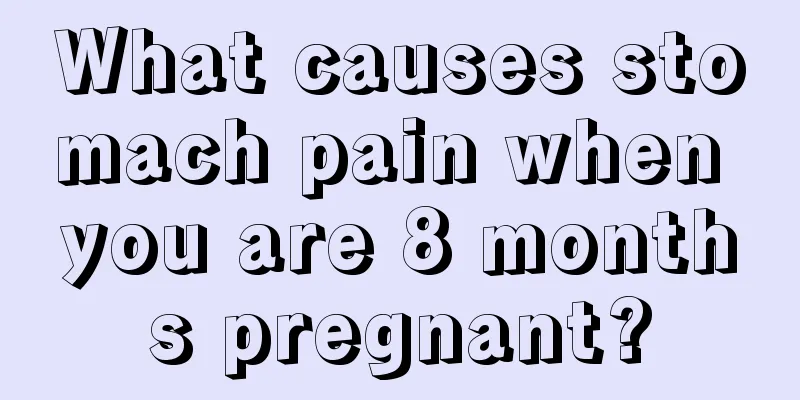What causes stomach pain when you are 8 months pregnant?

|
The eighth month of pregnancy is already the late stage of pregnancy, and the fetus has developed relatively well. However, many pregnant women in their eighth month still experience some discomfort symptoms, such as abdominal pain. Abdominal pain in late pregnancy is mainly caused by frequent period, uterine contractions, late miscarriage or reflux esophagitis. Below, I will introduce to you the common causes of abdominal pain during the eighth month of pregnancy! 1. Frequent fetal movement The fetal movements are active in the 8th month of pregnancy, and the frequent movements make the pregnant mother feel pain, but this stomach pain will disappear naturally after a while. This is normal. Of course, if the fetal movements are frequent and continue, you need to be highly vigilant, because it may mean that the fetus is not in good condition, such as hypoxia, which can cause great harm. For knowledge about frequent fetal movements, please read the recommended article below. 2. Uterine contractions Starting from the 28th week of pregnancy, the abdomen will often experience "false contractions". If the pregnant woman stands or sits in the same posture for a long time, she will feel her abdomen hardening (i.e. symptoms of tight stomach). This is "false contractions". Its characteristics are irregular time of occurrence and sometimes strong and sometimes weak degree. Before delivery, due to the traction stimulation of the lower segment of the uterus caused by the descending fetal head, false contractions will become more and more frequent. This is also normal. 3. Late miscarriage Late miscarriage mainly refers to abdominal pain and vaginal bleeding that occurs after 12 weeks of pregnancy. The process of late miscarriage is similar to childbirth. First there are waves of abdominal pain due to uterine contractions, and then placental detachment and bleeding. Therefore, the condition is more serious than early miscarriage, but generally late miscarriage rarely occurs. 4. Reflux esophagitis In the later stages of pregnancy, the fetus gradually grows larger and the intra-abdominal pressure also increases. If the hiatus widens, the bottom of the stomach can be pushed into the chest cavity through the widened esophageal hiatus. This is medically called a hiatal hernia. Because the upper opening of the stomach is loose, gastric acid, gas, and food in the stomach can reflux into the esophagus or mouth. Gastric acid stimulates the esophageal mucosa, and reflux esophagitis occurs, which can cause abdominal pain in pregnant mothers. This situation occurs occasionally and requires treatment in the hospital. |
<<: The first menstrual period of a child
Recommend
After the age of 50, the incidence of osteoporosis in women is more than 5 times that in men! Check if you are a "high-risk group" in one minute
Today (October 20) is the 27th World Osteoporosis...
What does an enlarged uterus mean?
During the examination, women often find that it ...
Does a lot of walking affect implantation?
If we walk a lot in our daily life, it will affec...
Can I use anesthesia after getting the new coronavirus vaccine?
This article is a copyrighted article from Tencen...
Why are there little white worms in cherries? What delicacies can be made from cherries?
Cherries are bright in color and sweet in taste. ...
"Henan Health" 24 Solar Terms · Minor Heat丨Midsummer is here, check out the "cool" measures to prevent heatstroke while it's hot
As the saying goes, "Minor Heat and Greater ...
Revealing the secrets of strabismus: A complete guide to early identification, treatment and postoperative care to protect your children’s bright eyes!
Every child is a treasure of the family, bringing...
What causes urine leakage in women?
The problem of urinary incontinence is not uncomm...
What to do if you haven't had your period for 15 days
If your period has not come for more than 15 days...
Does pelvic inflammatory disease require surgery?
There are many treatments for pelvic inflammatory...
What are the benefits of uterine maintenance?
Gynecological diseases are the most harmful to wo...
The day from the first day of menstruation is the ovulation period
A perfect egg is released in every normal menstru...
There is a painful swelling on the vulva with pus
Vulvar pustules are primarily caused by viral inf...
How long is the normal menstrual period?
Many female friends will have varying degrees of ...
Breast pain but no menstruation
Most people in life mistake breast pain for menst...









